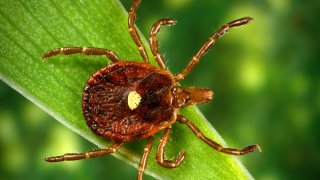
Health officials are reminding residents to protect themselves against tick-borne diseases after a case of Powassan virus was reported in Sharon, Massachusetts.
Powassan virus is transmitted through tick bites, like Lyme disease. While the virus is rare, cases have increased in recent years, according to the Town of Sharon Health Department.
Most people infected with Powassan won't experience any symptoms, but it can cause fever, headache, vomiting and weakness, according to the Centers for Disease Control and Prevention. In rare cases it can cause severe, potentially deadly illness like meningitis or an infection of the brain called encephalitis.
There are no vaccines or treatments for Powassan. The most effective preventative is to take precautions against tick bites, such as:
Get Boston local news, weather forecasts, lifestyle and entertainment stories to your inbox. Sign up for NBC Boston’s newsletters.
- wearing a bug repellent with DEET
- wearing long sleeves and pants and socks
- staying on trails to avoid tick habitats while hiking
- checking yourself, children and pets for ticks after spending time outdoors and immediately showering to remove any loose tickets
- using tick control, such as collars or other repellents, for your pets
Ticks are most active in the northeast from March through mid-May and again from August to November,
Sixteen cases of Powassan have been reported in Massachusetts in the last 10 years. More information from the state Department of Public Health is available here.
Local
In-depth news coverage of the Greater Boston Area.
Get updates on what's happening in Boston to your inbox. Sign up for our News Headlines newsletter.



